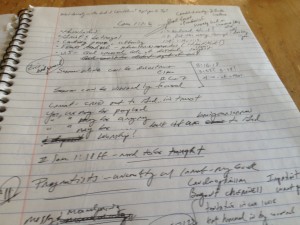Monthly Archives: September 2016
SERMON IN PROCESS
MAKING SENSE OF GOD
I wrote in a previous interview with Tim Keller, “He has a healthy aversion to sanctimony and platitudes. He has a low tolerance for simplistic answers. Years of pastoral ministry in the hurly-burly of New York have given him a deep desire to articulate the Christian faith with integrity. Keller’s ability to frame old issues in fresh ways is a hallmark of both his teaching and writing. “
I’ve read six other books by Keller, but Making Sense of God (https://www.amazon.com/Making-Sense-God-Invitation-Skeptical/dp/0525954155) may now be my favorite.
All the hallmarks of Keller’s writing appear. There is an integrative approach where wonderful quotes (no, I won’t use the overused “money” quotes!) from various disciplines are used throughout the book. Keller clearly keeps up in his reading, especially when it comes to philosophy, sociology, and cultural analysis. How many pastors do you know who have read Charles Taylor’s big book, A Secular Age not once, but three times? As Keller commonly says, he reads so widely because he is “desperate.” Many of us are beneficiaries due to Keller’s desperation.
Another common feature of Keller’s approach, especially as it relates to skeptics, is what I like to call “incremental apologetics.” This is where the skeptic is moved ever slowly. No big jumps from A to Z. The skeptic is paid the respect he deserves. The skeptic is truly listened to, and maybe most importantly, is confident that Keller is portraying his positions accurately. Given these realities it is not surprising that Keller would realize a “prequel” to The Reason for God was needed.
Related to the former is what I like to call “let’s talk on the bridge.” Keller models this well in both The Reason for God and in Making Sense of God. All sides are invited into a conversation (no bomb throwing allowed) where each participant is reminded that they utilize both faith and reason. This can be a tough sell for Christians and non-Christians alike, but it is crucial if real dialogue is to occur.
Making Sense of God is strong at showcasing the problems of a materialistic worldview. The problems that ensue from the reductionism of believing that the physical world is the totality of existence are a particular strength of Making Sense of God. And Keller does not just use Christians to answer materialists like Stephen Pinker. Rather, he highlights other skeptics like Julian Barnes whose reflections on the beauty of Mozart’s Requiem made him wonder whether physical reality is the sum total of human existence.
I close with one slight disappointment and a comment about source notes.
First, the slight disappointment. Keller writes, “All of us have things we believe—including things we would sacrifice and even die for–that cannot be proven. But since these beliefs cannot be proved, does this mean we ought not to hold them, or that we can’t know them to be true? We should, therefore, stop demanding that belief in God meet a standard of universally acknowledged proof when we don’t apply that to the other commitments on which we base our lives.” Granted there is an important truth there, but believing or not believing in God is far more costly than other matters, so it is understandable why we might “demand” more evidence. There may be sufficient evidence for Christianity, but it is understandable why many of us would like more. I found this a bit too quick of a dismissal of an honest objection, something that is uncharacteristic of Keller.
It may seem rather strange to finish this review with a comment about endnotes, but I must. I regularly scan the footnotes (these days they are almost always endnotes) to see whether the author has interacted with the best literature. Not only do Keller’s endnotes demonstrate his careful reading, but there really is a book within a book. My only concern here is that too many readers will forego reading the endnotes thinking they are unimportant, or simply too academic. For those willing to slow down and read the endnotes, they will find a treasure trove of bibliographic suggestions, further interaction, and fuller quotes.
DIDEROT EFFECT
“Sometimes it’s nice to learn that a psychological phenomenon has a name, if only so I no longer have to think of it as Me Being Uniquely Irrational And Self-Defeating. So it is with the Diderot effect – which, I learned recently (via Lifehacker), is the term for when you buy something new, but then it makes your other possessions look timeworn by comparison, so you end up replacing them, too. The inspiration here is Denis Diderot’s 1769 essay Regrets For My Old Dressing Gown, in which he recounts being given a luxurious replacement. “My old robe was one with the other rags that surrounded me,” Diderot laments. But “all is now discordant”. Before long, he’s obliged to replace his furniture and paintings as well: “I was the absolute master of my old robe. I have become the slave of the new one.”
https://www.theguardian.com/lifeandstyle/2015/oct/02/shopping-diderot-effect-oliver-burkeman
TRUMPSTER COFFEE!
ARE YOU PAYING ATTENTION?
Wonderful advice that economist Steven Levitt received from his dad:
I remember this one time–I must have been like seven or eight years old–my dad took me to Gibby’s Diner. This was in the closest village called Quaker Street. And Quaker Street is just like one stoplight, a general store and the diner. And all my brothers and sisters had at one point worked at Gibby’s Diner either cooking or as a waitress or whatnot. And for my dad to bring me there alone, the two of us to sit at the counter, to this kind of sacred place. It was surreal to be there. And I remember we sat at the counter, and I don’t remember what I got to eat, but I remember my dad got a cup of coffee with a scoop of vanilla ice cream in it, which looking back I realized–he could have been a Starbucks imaginer. And I was having whatever I was having, and he introduced me to this game he called Powers of Observation.
And the way Powers of Observation worked was he would say, “All right, Stevie. I just want you to look around and take it in. Just really look around, pay attention, see what you’re looking at, take it in, and get attuned–and listen hard to, OK?” Like I said, I was probably just eight or seven years old, and he said “I’m going to give you five minutes to just take it all in.”
So I sat there and I looked around; and I take it all in. And I don’t really know where he’s going with this. And then after a few minutes, he told me to close my eyes.
He’d say, “OK the waitress, Ann”–you know, we knew her, “Ann–what color is her apron?”
And I said, “White?” And he said, “Ahh, you’re just guessing.” And I said, “White!” And he said, “That’s right, that’s right. OK. The lady behind us, what did she just order?”
“Grilled cheese?”
“Nope. Chili. OK, how many people have come in since we started playing Powers of Observation?”
And on it went, just like that. And he’d grill me on these facts large and small, any kind of site, smell, sound–anything like that. And the first couple rounds we did this, I was terrible. I couldn’t get anything right at all. I just didn’t have any powers of observation. And then as we kept doing it, I got better. And then about after 20 minutes, I felt that I could take these little snapshots with my mind. And then repeat what I’d seen. My father, that one day, at Gibby’s Diner in Quaker Street, New York, he taught me that memory–or at least observation–is a muscle that you can build. And I’ve been flexing that muscle every day since then. Or at least trying to. So we were a family with practically no money, and without really that much time with each parent, but I will never forget that one day, that incredibly great thing, an incredibly valuable thing, that my father gave me.
The rest is here:
TIM KELLER’S LATEST: THE BEST?
My review on Tim Keller’s latest book will be coming in the next week or so. I’ve read six other books by Keller, but this may be my favorite.
https://www.amazon.com/Making-Sense-God-Invitation-Skeptical/dp/0525954155
I wrote in a previous interview with Keller, “He has a healthy aversion to sanctimony and platitudes. He has a low tolerance for simplistic answers. Years of pastoral ministry in the hurly-burly of New York have given him a deep desire to articulate the Christian faith with integrity. Keller’s ability to frame old issues in fresh ways is a hallmark of both his teaching and writing.”
THE VIRTUE OF AN EDUCATED VOTER
Professor Alan Taylor teaches at the University of Virginia. He has won the Pulitzer prize…twice! Look for a review or interview on his latest book in the months ahead.
Taylor has written a terrific piece on the need for an educated electorate (HT to www.thewayofimprovement.com). I spent some good time marking up and pondering Taylor’s critical assessment and prescription. Here’s a taste:
“Here then was the rub. Visionary leaders insisted that preserving a republic required improving the common people by an increased investment in education. But a republic depended on common voters who lacked schooling and often balked at paying for it, preferring to spend their money on consumer goods. As farmers, they also wanted to keep their children at work on the farm. To justify their preferences, they invoked a populist distrust of the educated. A rustic republican from North Carolina insisted, ‘College learned persons give themselves great airs, are proud, and the fewer of them we have amongst us the better.’ Preferring ‘the plain, simple, honest matter-of-fact republicanism,’ he asked, ‘Who wants Latin and Greek and abstruse mathematics at these times and in a country like this?’ Distrustful of all aristocrats, natural and artificial, he insisted that they should pay to educate themselves, and the poor could make do without book learning; thus, he would vote for candidates who kept taxes low. Common voters in the southern states often did not regard education as essential to preserving their republic.”
The rest is here: http://https://theamericanscholar.org/the-virtue-of-an-educated-voter/#.V9Yg-DX2Q6k
WHERE ARE WITHERSPOON AND MADISON WHEN WE NEED THEM?
Among other things, I am currently reading The Political Philosophy of James Madison. It is a terrific and terribly important read.
http://https://www.amazon.com/Political-Philosophy-Madison-American-Founders/dp/0801871069
Madison’s political philosophy was greatly influenced by preacher and Princeton president, John Witherspoon. Witherspoon’s influence is apparent in places like the Federalist Papers where you see Madison’s realistic view of man’s fallen nature.
“Democracies allow the greatest number of citizens in ruling, Witherspoon notes, but often, as he learned from Aristotle, they degenerate into mob rule, ‘deceived by demagogues’ and ‘subject to caprice and the madness of popular rage.'”
Do you think that is a word for us today?
https://www.amazon.com/Political-Philosophy-Madison-American-Founders/dp/0801871069
DAVID BARTON’S MISGUIDED HISTORY
A real historian writes to one making claims to be one:
HT: www.thewayofimprovement.com




